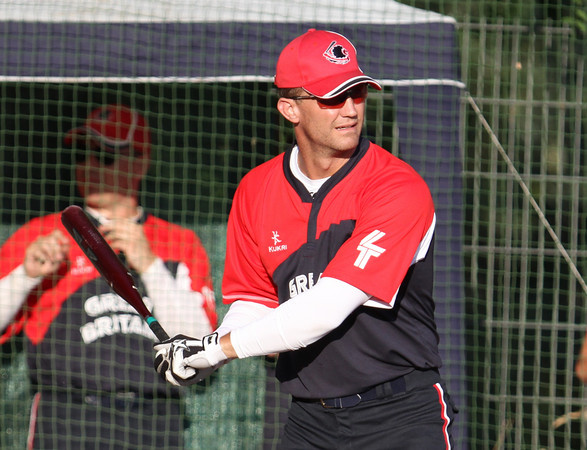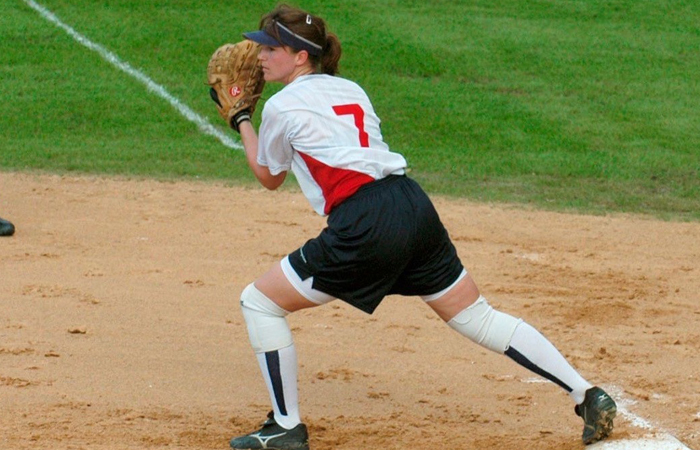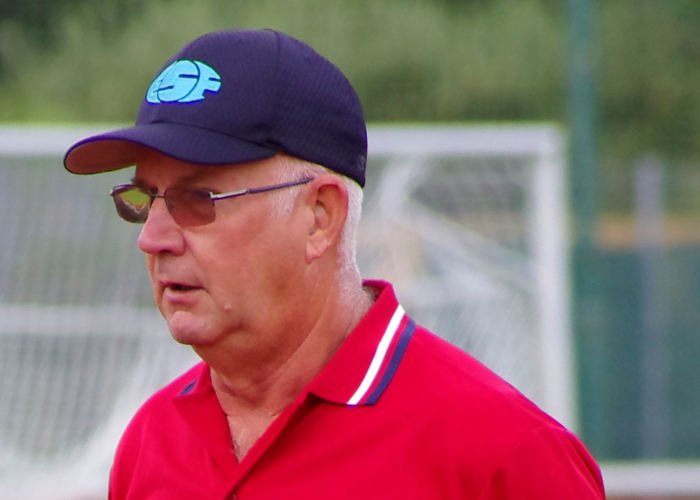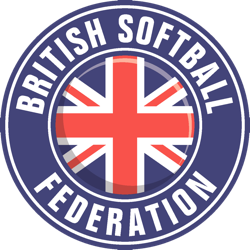Three members of the British softball community – former GB Slowpitch players Brett Gibbens and Steph Jardine, and BASU umpire Chris Moon – were inducted into the Softball Europe Hall of Fame on 12 February at the 2022 WBSC Europe Congress in Slovenia.
The three join former BSF and ESF Administrator Libby Moss as the only British members of the European Hall of Fame, and Brett Gibbens and Steph Jardine have the honour of being the first two slowpitch players to be voted in, 24 years after European slowpitch competitions first began.
Brett was a fearsome home run hitter and an athletic outfielder with a tremendous throwing arm who played on GB Co-ed Slowpitch Teams that won seven European Championships, while Steph was a key player on five European gold medal-winning GB Co-ed Slowpitch Teams.
Both Brett and Steph were dominant players in domestic slowpitch as well, Steph with four-time National Champions Baker Tomkins and Brett mainly with the Chromies at a time when the team began winning multiple national titles.
Chris Moon first qualified as a BASU slowpitch umpire in 2005 and went on to umpire at both European and World slowpitch Championships and Cups. He also served for many years as BASU’s Training Officer, as the Technical Officer on the BSF Executive and as a European Umpire-in-Chief.
European Hall of Fame trophies will be presented to Brett, Steph and Chris at selected tournaments during the coming season.
All three are members of the BSF Hall of Fame (Chris Moon will be inducted at this year’s AGM). Here are more details on the softball careers that led each of them to be honoured in Europe as well as in the UK:
Brett Gibbens

Brett Gibbens took part in the European Co-ed Slowpitch Championships listed below, all of which were won by Great Britain:
- 2000 in Dublin, Ireland
- 2002 in Mlady Buky, Czech Republic
- 2004 in Linz, Austria
- 2006 in Ljubljana, Slovenia
- 2008 in Southampton
- 2010 in Prague, Czech Republic
- 2013 in Pardibuce, Czech Republic
Brett also played for the British club team Chromies in European Slowpitch Cup competitions in 2010 in Ljubljana, where Chromies won the gold medal and in 2012 in Pardubice, where they took silver.
He finished his international career playing for Team Europe at the Border Battle featuring men’s slowpitch teams from the USA, Canada and Europe in Kitchener, Canada in 2014.
Power at the plate
In every European Co-ed Slowpitch Championship in which he played except for 2004, when he was injured for much of tournament, Brett led the GB Team in hits, home runs and RBIs. He was, and remains, the most prolific home run hitter to ever play in European slowpitch softball.
Although we do not have statistics for all these tournaments, here are two examples:
In the 2002 European Slowpitch Championship, Brett had 18 hits in 21 at-bats, including six doubles, a triple and eight home runs, with 15 runs scored and 20 RBIs.
In the 2010 European Slowpitch Championship, Brett had 22 hits in 25 at-bats, including 10 doubles and eight home runs, with 20 runs scored and 27 RBIs.
But Brett’s value to the GB Team was not only at the plate. A former high-level rugby player, Brett was an outstanding athlete, combining speed, courage and a powerful throwing arm to make spectacular plays in the outfield.
Current GB Slowpitch Assistant Coach David Lee, who played with Brett in a number of European Championships, wrote: “Brett’s flair for the dramatic was backed up by his ability to raise his game under pressure. He was always the go-to hitter for GB when things were tight.”
Former GB Slowpitch Head Coach Mark Saunders wrote, “Once he joined the GB Co-ed Slowpitch Team in 1999, Brett quickly became the most feared power hitter in Europe. No one trained harder or committed themselves to the programme more fully than Brett. His high-octane game play eventually put paid to his softball career due to injuries, but in typically single-minded fashion he has now trained to become a very successful chiropractor.”
Steph Jardine

Steph Jardine took part in the European Co-ed Slowpitch Championships listed below, all of which were won by Great Britain:
- 1998 in London
- 2000 in Dublin, Ireland
- 2002 in Mlady Buky, Czech Republic
- 2004 in Linz, Austria
- 2011 in Dupnitsa, Bulgaria
There were two main reasons why Steph took a break from GB Slowpitch between 2004 and 2011:
- At the age of 28, she decided to take up the challenge of playing fastpitch, made the GB Women’s Team and played for GB in the European Women’s Championship in 2005 and the ISF World Championship in Beijing in 2006.
- She then had a baby before returning for a final outing with GB Slowpitch in 2011.
In between, however, Steph won a gold medal with her club team, Baker Tomkins, at the second European Co-ed Slowpitch Cup in Dupnitsa in 2008.
Versatility
Steph Jardine was the ultimate utility player, capable of playing outstandingly in the infield, outfield and as a catcher, a position which is often overlooked in slowpitch but to which Steph added a huge amount of value. She was one of the best women slowpitch players in England over more than 20 years, starting in the early 1990s, and was a player who maximised her skills through hard work and intelligence.
But beyond her playing skills, Steph was always the most vocal and visible of team leaders, an inspiration for her teams.
She was at the heart of the Baker Tomkins team that won four straight national titles in the late 1990s and in the 2000 European Slowpitch Championship, she dominated the tournament, batting .714 (amazing for a female in slowpitch) and making the game-saving catch in the only game GB threatened to lose.
Steph played for the GB Slowpitch Team in three different decades, one of only two players to do so. In her late 20s, Steph took up fastpitch, and against all odds became a starter and a fine defensive first base player on a steadily improving GB Women's Fastpitch Team until she left the programme in 2006.
Former GB Slowpitch Team Head Coach Mark Saunders writes, “Steph was one of those players you never wanted to play against and always wanted to play with. She was the ultimate team player, always supportive, always encouraging and incredibly consistent both with the bat and glove. She did an amazing job of injecting energy into the team in all circumstances. Although not a power hitter, she was the perfect Number 2 hitter in a line-up, spraying the ball to all fields and always on base for the big guns coming up behind.”
On learning of Steph’s election to the Softball Europe Hall of Fame, Brett Gibbens wrote: “Congrats, Steph! Thoroughly deserved on your part. Always were the top female player and not sure many, if any, will surpass. Was nice to have someone on the base as consistently as you in front of me in the line-up.”
In response, Steph said: “I was thinking the other day how much I miss those softball days and was always grateful to Brett for making me run three bases every time I was on first! It’s lovely to know that the work we put into our game, and the fun we had as a part of GB Softball’s history, is recognised in awards like this. It’s the cherry on top of the icing on the cake.”
Chris Moon

Chris Moon was a qualified Rugby Union referee before becoming involved in softball umpiring, first at league level and then qualifying as a national-level official through the British Association of Softball Umpires (BASU) in 2005.
Since then, Chris has been highly active throughout British softball, predominantly in the slowpitch format (both single-sex and co-ed), typically umpiring more than 100 games each season until recently and acting as a Technical Commissioner or Umpire-in-Chief at Britain’s largest national events. One of these was the Softball World Series Tournament held annually in the UK, where he met many co-ed slowpitch softball teams from continental Europe for the first time.
Chris has been a Committee Member, Tutor / Mentor and a Training Officer for BASU, and was the appointed Technical Officer on the British Softball Federation Executive Board from 2011 until 2021.
Chris qualified as an ESF Umpire in 2010 and officiated at ESF Co-ed Slowpitch Cups and Championships, as well as at established European slowpitch events such as the Windmill Cup in The Netherlands. Eventually, he became the lead Umpire-in-Chief for slowpitch softball in Europe.
In 2013 Chris qualified as an ISF Slowpitch Umpire and from 2014 through 2016 called games at ISF Co-ed Slowpitch World Cups held in Plant City, Florida. He also developed close links with North American colleagues, friendships he made good use of by attending Softball Canada’s ‘Blues’ Convention to practice new training skills and by welcoming Canadian slowpitch umpires to Europe each year to take part in the annual ESF Exchange Programme.
Ever since those first contacts at the Softball World Series, Chris had become known and respected by all the European slowpitch teams he had met and served. He called his last ESF game during the European Co-ed Slowpitch Super Cup in 2016 in Wiener Neustadt, Austria, and retired, as umpires do, by ceremonially placing his cap on second base before leaving the field. All the teams present came to the field and provided a spontaneous salute by forming an arch of bats held aloft for his walk from second base back to home plate for the last time.
Dates of Service
- 2005-2020: BASU Umpire
- 2010-2016: ESF Umpire
- 2011-2021: BSF Technical Officer
- 2012-2020: BASU Training Officer
- 2013-2016: ISF Umpire
- 2016-2020: ESF/Softball Europe Umpire-in-Chief
